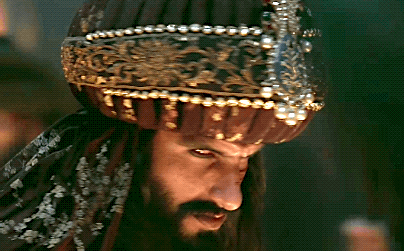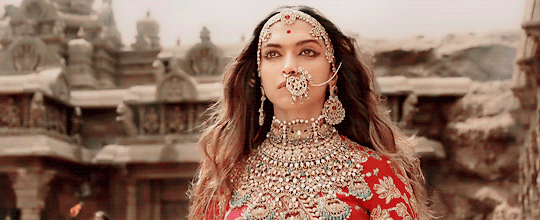
padmaavat
i keep on pronouncing padmaavat as 'paad-na-maat' which translate to "don't fart" and i think that truly is beautiful. someone help my hindi pls.
anyways this is some experts of reveiws of padmaavat. these do not represent my veiws on the movie. i haven't watched it yet or formed an opinion on it. don't attack me for other people's opinions.
□

title: 'i felt reduced to a vagina.'
author: Swara Bhaskar
source: https://thewire.in/218456/end-magnum-opus-i-felt-reduced-vagina/
background: In an open letter to Padmaavat director Sanjay Leela Bhansali, actor Swara Bhaskar decries glorification of sati and Jauhar.
- Women have the right to live, despite being raped sir.
- Women have the right to live, despite the death of their husbands, male 'protectors', 'owners', 'controllers of their sexuality' . . . whatever you understand the men to be.
- Women have the right to live - independent of whether men are living or not.
- Women have the right to live. Period.
It's actually pretty basic.
Some more basic points:
Women are not only walking talking vaginas. Yes, women have vaginas, but they have more to them as well. So their whole life need not be focused on the vagina, and controlling it, protecting it, maintaining it's purity. It would be nice if the vaginas are respected; but in the unfortunate case that they are not, a woman can continue to live. She need not be punished with death, because another person disrespected her vagina without her consent. There is life outside the vagina, and so there can be life after rape. In general there is more to life than the vagina.
You may be wondering why the hell I am going on and on thus about vaginas. Because Sir, that's what I felt like at the end of your magnum opus. I felt like a vagina. I felt reduced to a vagina-only. I felt like all the 'minor' achievements that women and women's movements have made over the years was pointless; because we were back to basics.
We were back to the basic question - of right to life. Your film, it felt, had brought us back to that question from the Dark Ages - do women - widowed, raped, young, old, pregnant, pre-pubescent . . . do they have the right to live?
I understand that Jauhar and Sati are a part of our social history. They happened. But then so did the lynchings of blacks by murderous white mobs in the 19th century in the US. Does that mean one should make a film about it with no perspective on racism? Or, without a comment on racial hatred? Worse, should one make a film glorifying lynchings as a sign of some warped notion of hot-bloodedness, purity, bravery - I don't know, I have no idea how possibly one could glorify such a heinous hate crime.
Surely Sir, you agree that Sati, and Jauhar are not practices to be glorified. Surely, you agree that notwithstanding whatever archaic idea of honour, sacrifice, purity propels women and men to participate in and condone such practices; that basically Sati and Jauhar, like the practice of Female Genital Mutilation (FGM) and Honour Killings, are steeped in deeply patriarchal, misogynist and problematic ideas. A mentality that believes that the worth of women lies in their vaginas, that female lives are worthless if the women are no longer controlled by male owners.
Practices like Sati, Jauhar, FGM, Honour Killings should not be glorified because they don't merely deny women equality, they deny women personhood. They deny women humanity. They deny women the right to life. And that is wrong. Surely, you wouldn't consider making a film glorifying FGM or Honour Killings!
Sir, you will say to me that I am over-reacting and that I must see the film in its context. That it's a story about people in the 13th Century. And in the 13th century that's what life was- polygamy was accepted, Muslims were beasts who devoured meat and women alike, and honourable Hindu women happily jumped into their husbands funeral pyre, and if they couldn't make it to the funeral, they built a pyre and rushed into it - in fact, they liked the idea of collective suicide so much that they gleefully discussed it over their daily beautification rituals.
You will say that you put out a disclaimer at the beginning of the film claiming that the film did not support Sati or Jauhar. Sure Sir, but you followed that up with a two-hour-45-minute-long paean on Rajput honour, and the bravery of honourable Rajput women who chose happily to sacrifice their lives in raging flames, than to be touched by enemy men who were not their husbands but were incidentally Muslim.
□

title: homophobic, islamaphobic and regressive padmaavat embodies its own protests.
author: -
source: https://www.inuth.com/entertainment/homophobic-islamophobic-and-regressive-padmaavat-embodies-its-own-protestors/
Bhansali, whose love for everything shiny and aesthetically pleasing is often mistaken for art in India, invests very little in the psyche of the queen. Big surprise that. He chooses to dwell on the legend of her. Thus, we have a sweeping spectacle where a criminally-wasted Deepika Padukone hurtles towards her destiny (read a giant well of fire), without even stopping to think. I know, I know, if you had made Padmavati even consider this decision, the country would have been set ablaze. But really Mr Bhansali, this?
Bhansali chooses to begin this tale in Afghanistan, where a young Khilji and a gang of surma-eyed men are being debauch while chomping on impossibly big hulks of raw meat. Bhansali doesn't waste a moment in establishing Khilji as the deplorable face of the Muslim "other". Ranveer Singh's Khilji is an exercise in unbridled excesses. On his wedding night, Khilji murders one of his closest aides, rapes one of his bride's friends and then dances like a maniac in front of a (CGI) bonfire.
In Padmaavat, the Kafur-Khilji track is packaged like the partnership of two deranged debauches, who, apart from conspiring to kill and plunder, also have sex with each other. In other words, Bhansali ensures that not even for a moment do we see these two as lovers. They are two men who are committed to a life of debauchery. Of course they will have homosexual tendencies.
□

title: this is not even a padmaavat review, this is not even a rant, its the confessuon of a survivor.
author: -
source: http://www.news18.com/news/opinion/this-is-not-a-padmaavat-review-this-is-not-even-a-rant-its-the-confession-of-a-survivor-1643291.html
While there is a disclaimer at the beginning that the film doesn't promote Jauhar or Sati, it actually ends up romanticising the brutal practice. And not to forget the maryaada, and aan-baan and shaan women have to uphold, while the men folk predatorily go after women like they are some prized trophies.
But there's more.
Let me get this straight, Padmaavat is Islamophobic. Muslims (read Khiljis) are portrayed as the 'other' who go on plundering whatever that comes across them, take away the women, and, wait for it, scheme debauchery while munching on huge amounts of meat. My Muslim friends who love their biryani and botti mustn't be happy at all.
These crude and exaggerated stereotypes, especially in the current political climate, feed into the paranoia flared by the Hindu right. Far-right groups on social media are already classifying Muslims as a dangerous, untruthful "out group". Guess Padmaavat will help them nurture their vicious nomenclature for Muslims. Again.
What's troubling isn't the premise that a straight man (read Khilji) might not be interested in the gay character Malik Kafur played by Jim Sarbh, but the blatant heterosexual promiscuity and the bludgeoning way it's handled. Not to mention the utter distortion of fact that Khilji was known for his homosexual leanings.
It's sad that the character of Kafur has been limited to just a homosexual stalker and schemer. Homophobia is incredibly apparent in the film.
Padmaavat is also symptomatic of a wider problem in Indian cinema: the invisible portrayal of gay characters that have no substance to offer and highly offensive homophobic jokes against them. An example of that is in this film as well: Ratan Singh's (Shahid Kapoor) royal guards describe Kafur as Alauddin's "begum", followed by a laugh by the sword wielding, valor-injected Rajput soldiers.
□

□
personally, i choose to share these experts in order to remind you all to be aware of the stigma it holds for certain minorities/groups. i'm not saying "don't watch padmaavat!!!!", i'm saying be aware of the issues that groups have with it. enjoy padmaavat (i'm watching it soon!!!!) and stay woke i guess???

ok bye!!
Bạn đang đọc truyện trên: Truyen247.Pro